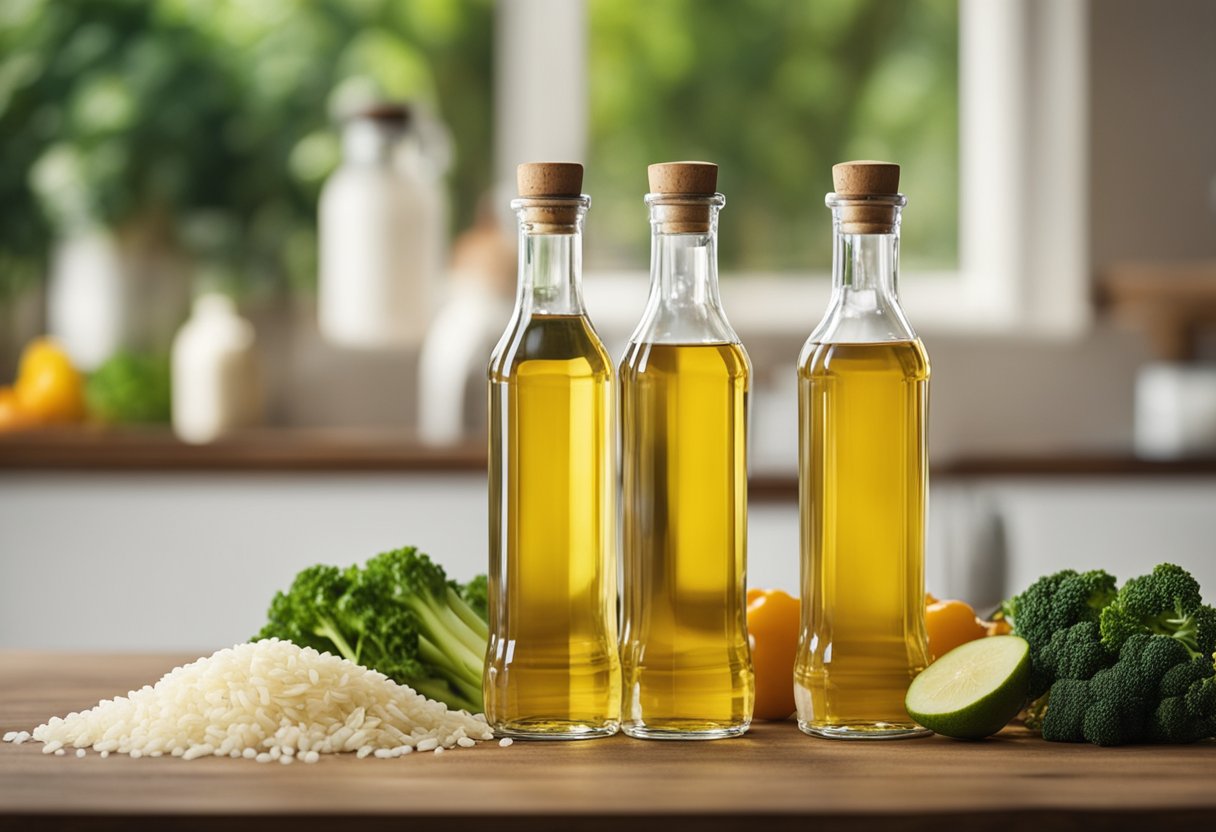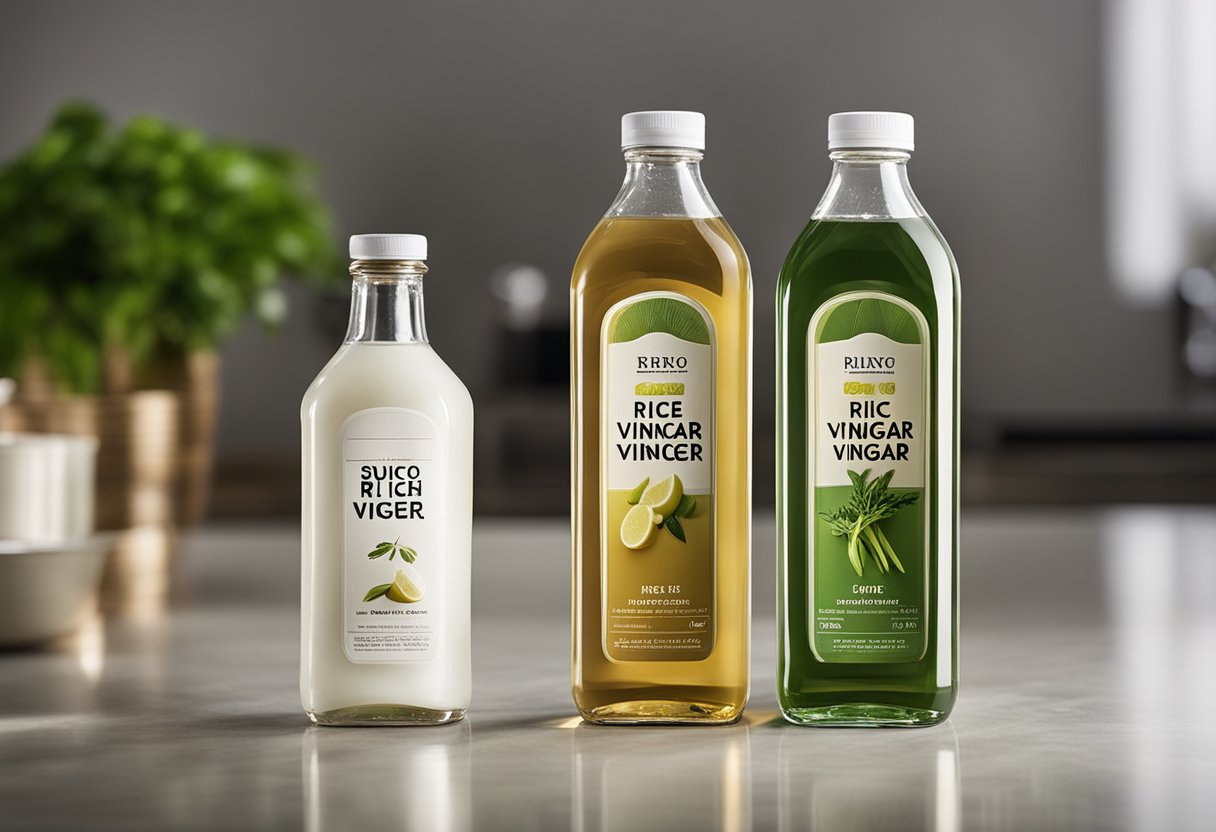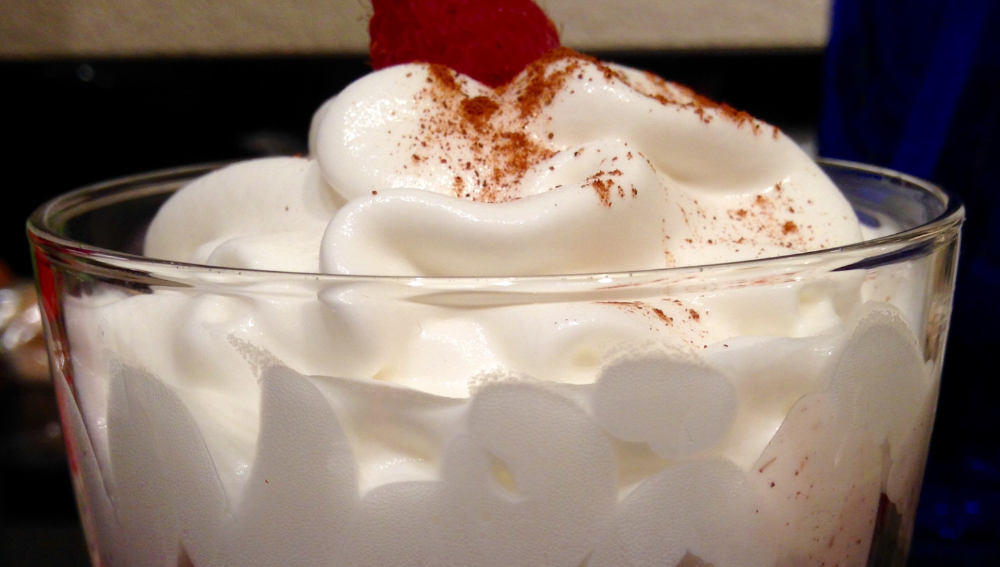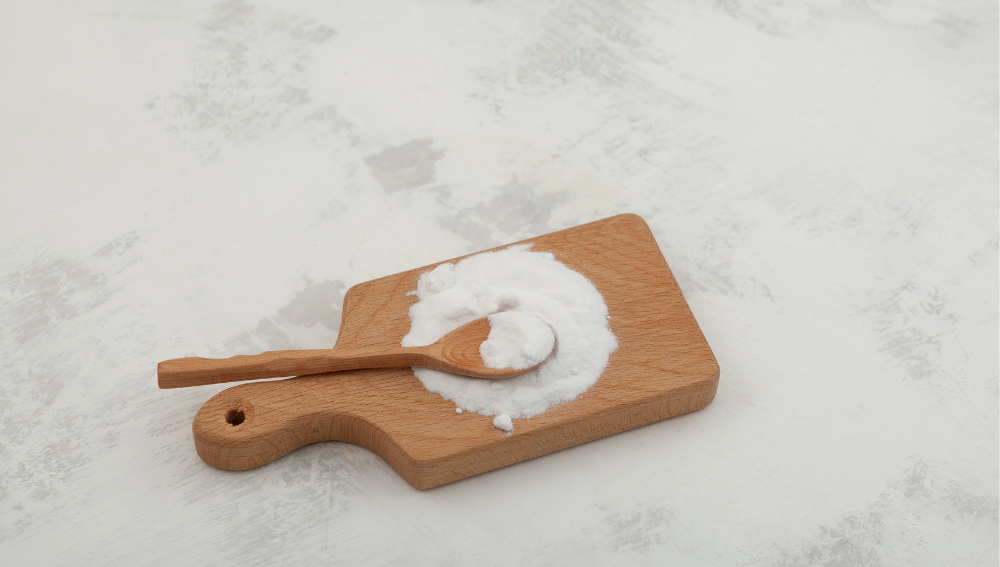As a home cook or culinary enthusiast, you may have come across different types of vinegar in recipes. Rice vinegar and white vinegar are two of the most commonly used vinegars in cooking.
While both are acidic and have a similar tangy taste, there are notable differences between the two. In this article, I will explore the key differences between rice vinegar and white vinegar, their unique flavor profiles, and their culinary uses.

Understanding Vinegars Before we delve into the differences between rice vinegar and white vinegar, it’s important to understand what vinegar is and how it’s made.
Vinegar is a sour liquid that is made by fermenting alcohol or other acidic liquids. The fermentation process converts the alcohol or sugar into acetic acid, which gives vinegar its characteristic tangy taste.
Different types of vinegar are made from different ingredients, which can affect their flavor, color, and acidity levels.
Key Takeaways
- Rice vinegar and white vinegar are two of the most commonly used vinegars in cooking, but they have notable differences in flavor and color.
- Rice vinegar is made from fermented rice and has a milder, sweeter taste, while white vinegar is made from grains like corn and has a sharper, more acidic taste.
- Rice vinegar is commonly used in Asian cuisine, while white vinegar is often used in pickling, cleaning, and non-culinary applications.
Understanding Vinegars
As a cooking ingredient, vinegar is an excellent addition to many dishes, and it is also used in many cleaning and disinfecting applications.
Vinegar is a liquid that contains acetic acid, and it is made by fermenting alcohol. There are many types of vinegar, including rice vinegar and white vinegar.
Rice vinegar and white vinegar are different kinds of vinegar that share a crisp, clean taste. Rice vinegar is made from fermented rice, while white vinegar is derived from grains such as corn and various wheat-based alcohol derivatives.
Perhaps more than anything, this is what sets these two types of vinegar apart the most.
One of the main differences between rice vinegar and white vinegar is their acidity level. White vinegar is more acidic than rice vinegar, which makes it a better choice for cleaning and disinfecting.
Rice vinegar has a milder flavor and is often used in Asian cuisine, particularly in Japanese, Chinese, and Korean dishes.
Another difference between rice vinegar and white vinegar is their alcohol content. White vinegar is made from grain alcohol, while rice vinegar is made from rice wine.
Rice vinegar typically has a lower alcohol content than white vinegar, which makes it a better choice for cooking and marinating.
Acetic acid is the primary component of vinegar, and it is what gives vinegar its sour taste. White vinegar has a higher acetic acid content than rice vinegar, which makes it more acidic. Rice vinegar, on the other hand, has a milder flavor due to its lower acetic acid content.
Fermentation is the process by which vinegar is made. During fermentation, alcohol is converted into acetic acid by bacteria.
Rice vinegar and white vinegar are both made through the fermentation process, but they use different starting materials. Rice vinegar is made from fermented rice, while white vinegar is made from fermented grains.
In summary, rice vinegar and white vinegar are two different types of vinegar that are used for different purposes. White vinegar is more acidic and is often used for cleaning and disinfecting, while rice vinegar has a milder flavor and is often used in Asian cuisine.
Understanding the differences between these two vinegars can help you choose the right one for your cooking or cleaning needs.
Rice Vinegar
Rice vinegar is a type of vinegar that is made from fermented rice. It is a popular ingredient in Asian cuisine, particularly in Japan. Rice vinegar is also known as rice wine vinegar, and it is used in many dishes, including sushi rice and Chinese cooking.
There are different types of rice vinegar, including black rice vinegar, red rice vinegar, and seasoned rice vinegar. Black rice vinegar is made from black glutinous rice and has a strong, smoky flavor.
Red rice vinegar is made from red yeast rice and has a slightly sweet taste. Seasoned rice vinegar is a blend of rice vinegar, sugar, and salt, and it is often used in sushi rice.
Rice vinegar is also used in marinades, dressings, and sauces. It has a mild, slightly sweet flavor that complements many dishes.
When using rice vinegar in cooking, it is important to choose the right type for the dish. For example, seasoned rice vinegar is best for sushi rice, while black rice vinegar is ideal for stir-fries.
In addition to rice vinegar, another common ingredient in Asian cooking is Chinese cooking wine, also known as Shaoxing wine. This wine is made from fermented rice and is often used in marinades and stir-fries. It has a strong, nutty flavor that adds depth to dishes.
Overall, rice vinegar is a versatile ingredient that is used in many dishes in Asian cuisine. Its mild flavor and acidity make it a great addition to marinades, dressings, and sauces.
White Vinegar
https://www.youtube.com/watch?v=7wtf0xQspvA
I have always had a bottle of white vinegar in my pantry, and for good reason. White vinegar is a clear, neutral-tasting vinegar that is widely used in Western cuisine.
It is made by fermenting grain alcohol with acetic acid bacteria and then distilling the resulting liquid. White vinegar typically has an acidity level of 5-8%, which makes it a great choice for cleaning and disinfecting.
One of the most common uses for white vinegar is as a cleaning agent. Due to its acidic nature, white vinegar is effective at breaking down dirt, grime, and stains.
It can be used to clean surfaces like countertops, floors, and windows. It can also be used to remove odors from fabrics and to clean kitchen appliances like coffee makers and dishwashers.
In addition to its cleaning properties, white vinegar is also used in cooking. It is often used in pickling and canning, as well as in salad dressings and marinades.
However, it is important to note that white vinegar has a strong, sharp taste that can be overpowering if used in large quantities. It is best used in small amounts to add acidity and brightness to dishes.
Overall, white vinegar is a versatile and useful ingredient to have in your kitchen and cleaning arsenal. Its neutral taste and high acidity make it a great choice for a variety of applications, from cooking to cleaning.
Taste and Flavor Profiles
When it comes to taste and flavor, rice vinegar and white vinegar have distinct differences. Rice vinegar has a mild and slightly sweet taste with a subtle rice undertone.
It is less tart than white vinegar and has a delicate flavor that is perfect for sushi rice, pickling, and marinades. The sweetness in rice vinegar comes from the addition of sugar during the fermentation process.
On the other hand, white vinegar has a sharp, spicy flavor with a clean, neutral background, imparting a robust tang.
It is highly acidic and has a sour taste that can overpower other flavors if used in large quantities. White vinegar is often used for cleaning, preserving food, and making pickles.
While both vinegars have a vinegar taste, the flavor profile of each vinegar is unique. Rice vinegar is more delicate and less harsh than white vinegar, making it a popular choice for Asian cuisine.
White vinegar, on the other hand, is more pungent and is often used in Western cuisine.
Overall, the choice of vinegar depends on the recipe and personal preference. If you want a milder taste, go for rice vinegar. If you want a stronger vinegar taste, white vinegar is the way to go.
Culinary Uses
As a versatile ingredient, both rice vinegar and white vinegar can be used in various culinary applications.
For cooking, white vinegar is commonly used as a natural cleaning agent due to its high acidity level.
However, it can also be used as an ingredient in recipes such as pickles, marinades, and barbecue sauces. Its neutral flavor makes it a good substitute for other acidic ingredients like lemon juice or wine vinegar.
On the other hand, rice vinegar is a staple in Asian cuisine and is used in dishes like sushi rice, dipping sauces, and vinaigrettes.
It has a milder acidity level than white vinegar, making it a great addition to salad dressings and sauces. It is also used in pickling vegetables as it adds a unique flavor to them.
In baking, white vinegar can be used as a substitute for buttermilk or baking powder. It can also be added to pie crusts to make them flakier. Rice vinegar, on the other hand, is not commonly used in baking due to its mild flavor.
For preserving, both vinegars can be used to pickle vegetables. White vinegar is commonly used as it has a higher acidity level which helps preserve the vegetables for a longer period of time.
Rice vinegar can also be used for pickling, but it adds a unique flavor to the vegetables.
In salad dressings, both vinegars can be used as a base. White vinegar is often paired with olive oil and herbs to create a classic vinaigrette. Rice vinegar, on the other hand, is often paired with sesame oil and soy sauce to create an Asian-inspired dressing.
Overall, both rice vinegar and white vinegar have their unique uses in the kitchen. It’s important to choose the right vinegar for the recipe to ensure the best flavor.
Substitutes for Vinegars
When it comes to cooking, vinegar is a versatile ingredient that adds a tangy flavor to dishes. However, if you don’t have rice vinegar or white vinegar on hand, there are several substitutes you can use.
White Wine Vinegar
White wine vinegar is a popular substitute for both rice vinegar and white vinegar. It has a mild, slightly acidic taste that makes it an excellent addition to salad dressings, marinades, and sauces.
It’s made through the fermentation of white wine into vinegar and has a similar color and acidity level to rice vinegar.
Red Wine Vinegar
Red wine vinegar is another substitute for rice vinegar and white vinegar. It has a more robust and bold flavor than white wine vinegar and is perfect for use in rich sauces and marinades.
It’s made through the fermentation of red wine into vinegar, which gives it a deep red color.
Balsamic Vinegar
Balsamic vinegar is a popular ingredient in Italian cuisine and is a great substitute for rice vinegar and white vinegar.
It has a sweet and tangy flavor that works well in salad dressings, marinades, and glazes. It’s made from cooked grape must and can vary in color from dark brown to light amber.
Apple Cider Vinegar
Apple cider vinegar is a versatile substitute for rice vinegar and white vinegar. It has a slightly sweet and fruity flavor that complements savory dishes.
It’s made from fermented apple juice and can be used in salad dressings, marinades, and sauces.
Black Vinegar
Black vinegar is a staple in Chinese cuisine and is a great substitute for rice vinegar. It has a rich, smoky flavor and is perfect for use in stir-fries, marinades, and dipping sauces. It’s made from rice, wheat, barley, or sorghum and has a dark color.
Mirin
Mirin is a sweet Japanese rice wine that can be used as a substitute for rice vinegar. It has a mild, sweet flavor and is perfect for use in marinades, sauces, and glazes. It’s made from rice, koji, and shochu and has a low alcohol content.
Lemon Juice
Lemon juice is a citrusy substitute for rice vinegar and white vinegar. It has a bright, acidic flavor that complements salads, marinades, and sauces. It’s made from fresh lemon juice and can be used in equal amounts as a substitute for vinegar in recipes.
In conclusion, there are several substitutes for rice vinegar and white vinegar that you can use in your cooking. Each substitute has its unique flavor and can be used in different dishes.
Health Benefits and Nutritional Information
As someone who values a healthy lifestyle, I always try to choose ingredients that offer nutritional benefits. When it comes to vinegar, rice vinegar and white vinegar are two popular options.
Here’s what I know about the health benefits and nutritional information of these two types of vinegar.
First, let’s talk about the nutritional information. According to WebMD, rice vinegar and white vinegar are both low in calories, with about 3 calories per tablespoon.
They also contain small amounts of potassium, magnesium, calcium, and phosphorus. However, they are not significant sources of any vitamins or minerals.
When it comes to health benefits, vinegar in general has been shown to have some positive effects on cholesterol levels and heart health.
According to a study published in the Journal of Food Science, vinegar consumption has been associated with lower levels of LDL cholesterol and triglycerides, which are both risk factors for heart disease.
However, it’s important to note that these studies were not specific to rice vinegar or white vinegar, and more research is needed to determine if there are any differences in health benefits between the two types of vinegar.
In terms of diabetes, vinegar has been shown to have some potential benefits. According to the American Diabetes Association, vinegar consumption may improve insulin sensitivity, which can help regulate blood sugar levels.
However, again, more research is needed to determine if there are any differences in benefits between rice vinegar and white vinegar specifically.
Overall, while rice vinegar and white vinegar may not be significant sources of nutrition, they do offer some potential health benefits. As always, it’s important to consume these ingredients in moderation and as part of a balanced diet.
Vinegar in Different Cuisines

Vinegar is an essential ingredient in many cuisines around the world, and different types of vinegar are used in different ways. In Asian cuisine, rice vinegar is a staple ingredient, especially in Japanese, Chinese, and Vietnamese cooking.
In Japan, rice vinegar is used in sushi rice, dressings, and marinades. It has a mild and slightly sweet flavor, which makes it perfect for balancing the flavors in dishes like sushi and sashimi.
Japanese rice vinegar is made from fermented rice and has a lower acidity than other types of vinegar.
Chinese cooking wine, also known as Shaoxing wine, is another type of vinegar used in Chinese cuisine. It is made from fermented rice and has a complex flavor that is both sweet and savory.
It is often used in marinades, stir-fries, and braising liquids to add depth and complexity to the dish.
In Vietnamese cuisine, rice vinegar is used in dipping sauces, marinades, and dressings. It has a slightly sweet and sour taste that pairs well with fresh herbs and vegetables.
Vietnamese rice vinegar is made from fermented rice and has a higher acidity than Japanese rice vinegar.
While rice vinegar is the most commonly used vinegar in Asian cuisine, white vinegar is also used in some dishes.
In Chinese cuisine, white vinegar is used in sweet and sour dishes, pickles, and dumpling dipping sauces. It has a sharp and acidic taste that helps to cut through the sweetness of the dish.
Overall, vinegar is a versatile ingredient that can be used in a variety of dishes and cuisines. Whether you’re making sushi, stir-fry, or pickles, there’s a type of vinegar that will work perfectly.
Understanding the Fermentation Process
As I delve deeper into the differences between rice vinegar and white vinegar, it’s important to understand the fermentation process that creates both of these vinegars.
Fermentation is the process by which sugars are converted into alcohol and then into acetic acid by acetic acid bacteria. This process is what gives vinegar its characteristic sour taste and pungent smell.
Rice vinegar is made through a two-step fermentation process that starts with rice wine made from fermented glutinous rice.
The rice wine is then fermented again with acetic acid bacteria to produce rice vinegar. This type of vinegar has a milder taste and is commonly used in Asian cuisine for pickling, marinades, and dressings.
White vinegar, on the other hand, is made from grains such as wheat, corn, barley, or sorghum. The grains are first fermented to produce ethanol, which is then oxidized into acetic acid by acetic acid bacteria.
This type of vinegar has a stronger taste and is commonly used for cleaning, pickling, and preserving food.
Red yeast rice, a type of fermented rice, is sometimes used in the production of rice vinegar to add color and flavor to the final product.
However, it’s important to note that the use of red yeast rice can also lead to the production of a toxic substance called citrinin, which can be harmful to human health.
Overall, the fermentation process plays a crucial role in determining the taste, color, and aroma of vinegar. Understanding this process can help you choose the right vinegar for your culinary needs.
Vinegar in Non-Culinary Uses

As versatile as vinegar is in cooking, its usefulness extends far beyond the kitchen. Here are some of the non-culinary uses of vinegar:
Cleaning and Disinfecting
Vinegar is a natural cleaning agent that can be used to clean and disinfect various surfaces around the house. It’s effective in removing dirt, grime, and stains, and it’s also a natural deodorizer.
Mix equal parts of vinegar and water to create a cleaning solution that can be used on floors, countertops, and windows. For tough stains, use undiluted vinegar.
Refrigerator
Vinegar is an excellent alternative to harsh chemical cleaners when it comes to cleaning your refrigerator.
The acetic acid in vinegar helps to kill bacteria and remove stains and odors. Mix equal parts of vinegar and water in a spray bottle and use it to wipe down the inside of your refrigerator.
Tub
Vinegar is an excellent cleaner for your bathtub and shower. The acetic acid in vinegar helps to break down soap scum and remove hard water stains.
Mix equal parts of vinegar and water in a spray bottle and use it to clean your bathtub and shower. For tough stains, use undiluted vinegar.
Other Uses
Vinegar has many other uses around the house. Here are some of them:
- Remove rust from metal tools and surfaces by soaking them in vinegar overnight.
- Clean and deodorize your garbage disposal by pouring vinegar down the drain and running the disposal.
- Remove stains from clothing by soaking them in vinegar before washing.
- Remove stickers and adhesive residue by applying vinegar to the area and letting it sit for a few minutes before wiping it away.
In conclusion, vinegar is a versatile and natural cleaning agent that can be used in many non-culinary ways around the house. Its effectiveness in cleaning and disinfecting makes it a great alternative to harsh chemical cleaners.
Frequently Asked Questions
Can rice vinegar be used as a substitute for white vinegar?
Yes, rice vinegar can be used as a substitute for white vinegar in many recipes. However, it is important to note that rice vinegar has a milder flavor and lower acidity than white vinegar, so it may not be the best substitute in recipes that require a strong vinegar flavor or high acidity.
What is the difference between rice vinegar and white vinegar in terms of acidity?
In terms of acidity, white vinegar is more acidic than rice vinegar. White vinegar typically has an acidity level of around 5%, while rice vinegar has an acidity level of around 4%. This difference in acidity can affect the taste and texture of dishes that use these vinegars.
What are the benefits of using rice vinegar over white vinegar?
Rice vinegar has a milder flavor and aroma than white vinegar, which can be beneficial in recipes where a strong vinegar flavor is not desired.
Additionally, rice vinegar is often used in Asian cuisine and can add a unique flavor profile to dishes. Rice vinegar also contains some nutrients, including potassium and magnesium.
Can white vinegar be used for pickling instead of rice vinegar?
Yes, white vinegar can be used for pickling instead of rice vinegar. However, the resulting pickles may have a stronger vinegar flavor than if rice vinegar were used. Additionally, some people prefer the milder flavor of rice vinegar in pickling recipes.
Is rice vinegar or apple cider vinegar better for cooking?
Both rice vinegar and apple cider vinegar can be used for cooking, but they have different flavor profiles.
Rice vinegar has a milder, sweeter flavor than apple cider vinegar, which has a tangy, slightly fruity flavor. The choice of vinegar depends on the recipe and personal preference.
Can white vinegar be used for cleaning instead of rice vinegar?
Yes, white vinegar can be used for cleaning instead of rice vinegar. Both vinegars have similar cleaning properties and can be used to clean surfaces, remove stains, and deodorize.
However, white vinegar has a stronger smell than rice vinegar, which may be a concern for some people.







